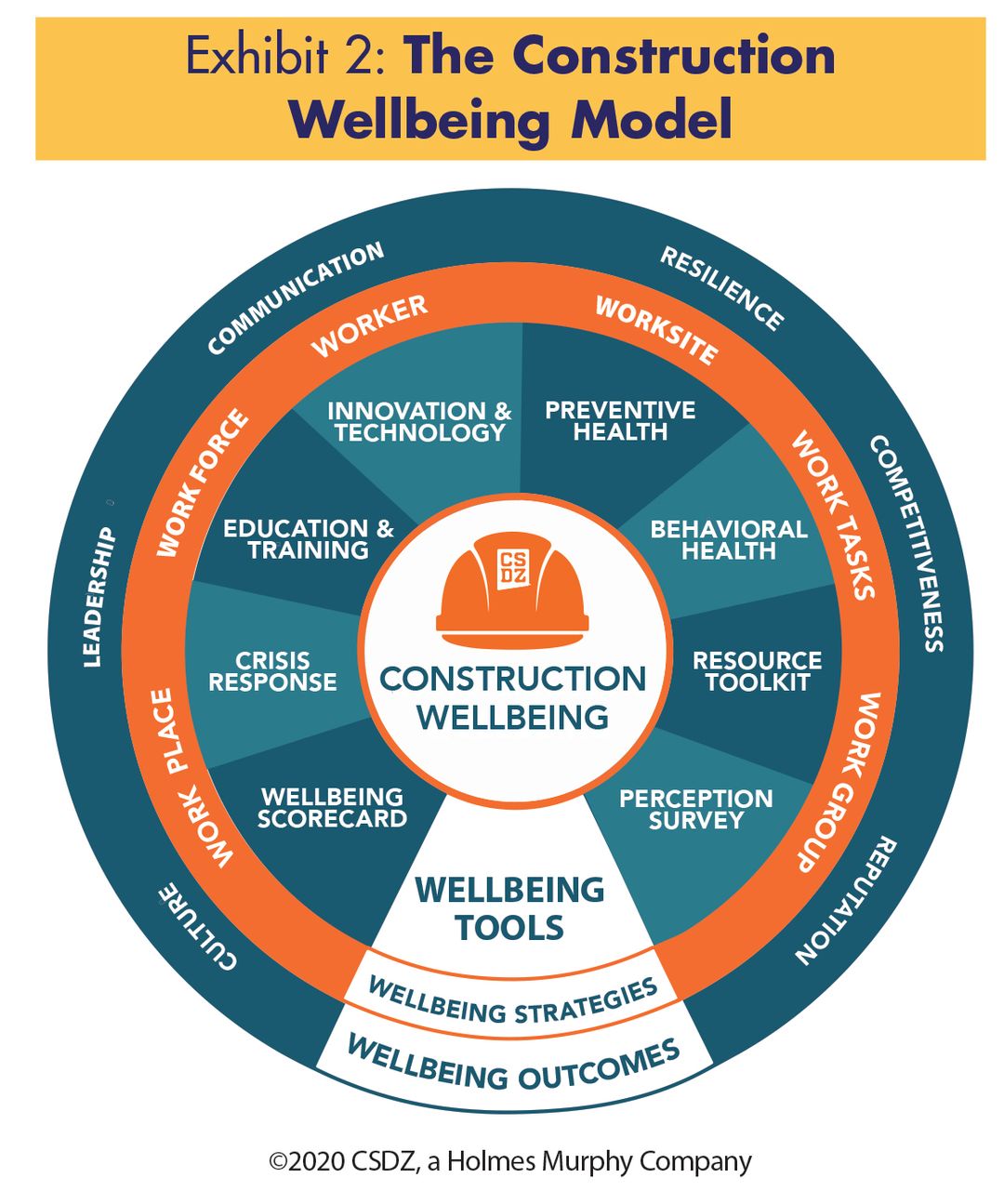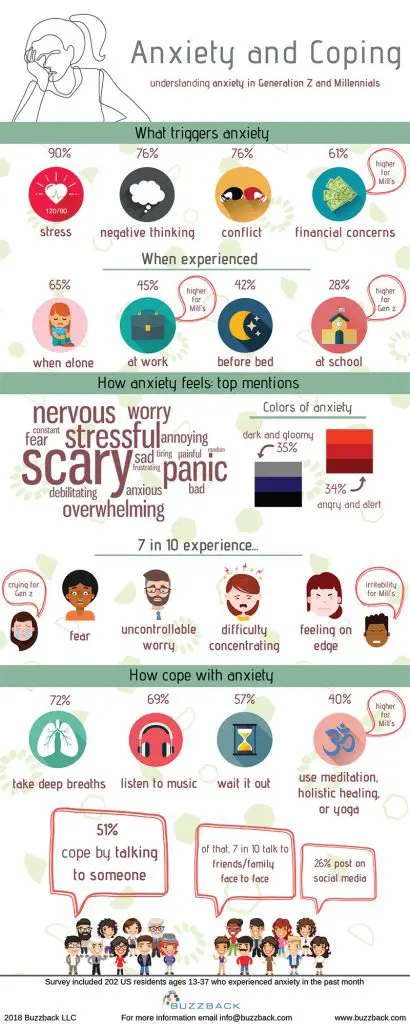Are you a construction manager? Do you often find yourself feeling overwhelmed and anxious due to the demands and pressures of your job? If so, we have the perfect solution for you. Introducing “Managing Anxiety in the Construction Industry,” a comprehensive program designed specifically for construction managers like yourself who are looking to effectively navigate and overcome anxiety in their professional lives. Through practical strategies and expert guidance, this program aims to equip you with the tools necessary to manage your anxiety and thrive in the fast-paced world of construction management. Say goodbye to sleepless nights and constant worry, and say hello to a calmer, more confident you.
Understanding Anxiety in the Construction Industry
Anxiety is a common mental health condition that affects individuals across various industries, including the construction sector. It is important to have a clear understanding of what anxiety is, how it manifests in the construction industry, and why construction workers are particularly prone to experiencing anxiety.
Defining Anxiety
Anxiety can be described as a state of excessive worry, fear, and unease. It is often accompanied by physical symptoms such as increased heart rate, sweating, and trembling. In the context of the construction industry, anxiety may arise from various factors including job-related stressors, workplace dynamics, and personal circumstances.
How Anxiety Manifests in the Construction Industry
In the construction industry, anxiety may manifest in different ways. Workers may experience heightened levels of stress due to tight deadlines, budget constraints, and project complexities. Uncertainty regarding job stability and satisfaction can also contribute to the development of anxiety. Additionally, the demanding nature of the work, coupled with safety concerns and interpersonal dynamics, further exacerbate the presence of anxiety among workers.
Why Construction Industry Workers are Prone to Anxiety
There are several reasons why construction industry workers are particularly prone to experiencing anxiety. Firstly, the pressures of time and budget are inherent in construction projects, leading to high levels of stress. Additionally, the nature of construction work, characterized by job uncertainty and the lack of job satisfaction, can contribute to anxiety. The excessive workload and burnout experienced by many construction workers, as well as the risks and safety concerns associated with the industry, also play a significant role in the development of anxiety. Moreover, interpersonal and team dynamics can create a stressful work environment that further contributes to anxiety among construction workers.
Identifying Anxiety Triggers in the Construction Industry
In order to effectively manage anxiety in the construction industry, it is important to identify common triggers that contribute to its development. By recognizing these triggers, both employers and employees can work together to implement strategies that mitigate anxiety and promote mental well-being on construction sites.
Pressures of Time and Budget
One of the primary anxiety triggers in the construction industry is the constant pressure to meet tight deadlines and stay within budgetary constraints. The construction sector operates under strict timelines, with clients expecting projects to be completed on time and within the agreed-upon budget. This can create a high-stress environment where workers feel immense pressure to deliver results, often leading to increased anxiety levels.
Job Uncertainty and Job Satisfaction
The construction industry is known for its cyclical nature and fluctuating demand. This can create a sense of job uncertainty among workers, leading to anxiety about job stability and long-term career prospects. Additionally, the lack of job satisfaction or fulfillment can contribute to feelings of anxiety, as employees may feel trapped in a job that does not align with their goals or values.
Work Overload and Burnout
Construction workers often face heavy workloads, juggling multiple projects simultaneously. This can lead to work overload and subsequent burnout, which significantly impacts mental well-being and increases the likelihood of experiencing anxiety. The demanding nature of construction work, coupled with long hours and physically demanding tasks, can take a toll on workers’ mental health and exacerbate anxiety symptoms.
Risk and Safety Concerns
The construction industry inherently carries certain risks and safety concerns. Workers may face hazardous conditions, work at heights, or handle heavy machinery, which can contribute to anxiety and heightened stress levels. The constant need to prioritize safety while completing tasks efficiently and on time can create a challenging environment that impacts workers’ mental well-being.
Interpersonal and Team Dynamics
Effective teamwork is crucial in the construction industry, but it can also be a source of anxiety. Conflicts, communication breakdowns, and power dynamics within teams can contribute to a stressful work environment. Negative interpersonal interactions and a lack of support from colleagues or superiors can amplify feelings of anxiety among construction workers.
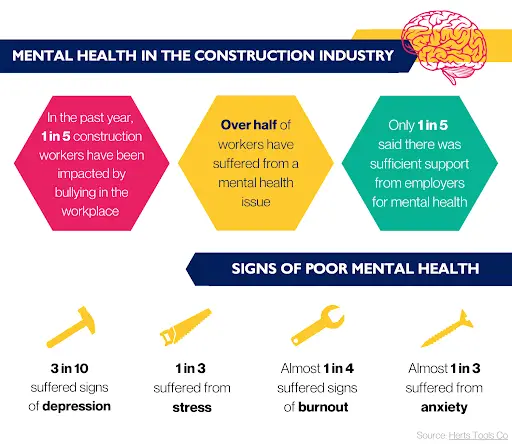
This image is property of hertstools.co.uk.
Physical Symptoms of Anxiety Among Construction Workers
Anxiety can manifest in a variety of physical symptoms that can significantly impact construction workers’ well-being and overall health. By understanding these symptoms, both employers and workers can recognize signs of anxiety and take appropriate steps to address them.
Insomnia or Broken Sleep Patterns
One common physical manifestation of anxiety among construction workers is difficulty sleeping. Anxiety can cause individuals to experience insomnia or broken sleep patterns, leaving them feeling fatigued and irritable. The demanding nature of construction work combined with the presence of anxiety can create a vicious cycle, further exacerbating sleep disturbances.
Chronic Fatigue
Anxiety can also lead to chronic fatigue, as the constant worry and heightened stress levels can drain individuals physically and mentally. Construction workers experiencing anxiety may struggle to maintain their energy levels throughout the day, impacting their ability to perform tasks effectively and safely on the job site.
Palpitations or Chest Discomfort
Increased heart rate, palpitations, and chest discomfort are physiological symptoms often associated with anxiety. Construction workers who experience anxiety may notice these symptoms, which can be distressing and further contribute to their feelings of anxiety. It is important for individuals experiencing these physical symptoms to seek appropriate support and guidance.
Headaches, Stomachaches, and Other Physical Manifestations
Anxiety can manifest in various physical symptoms, including headaches, stomachaches, muscle tension, and overall bodily discomfort. If left unmanaged, these symptoms can have a significant impact on construction workers’ well-being, affecting their ability to perform their job duties effectively and resulting in decreased productivity.
Psychological and Emotional Impact of Anxiety in Construction
Anxiety not only affects construction workers physically but also has a profound psychological and emotional impact. It is crucial to recognize and address these effects to ensure the overall mental well-being of workers in the construction industry.
Depression and Mood Disorders
Untreated anxiety can contribute to the development of mood disorders, such as depression. Construction workers experiencing anxiety may struggle with persistent feelings of sadness, loss of interest in activities, and a general sense of hopelessness. These symptoms can significantly impact their overall mental health and quality of life.
Worsened Performance and Productivity
Anxiety can impair cognitive functioning, making it difficult for construction workers to concentrate, problem-solve, and make decisions. The constant worry and preoccupation associated with anxiety can significantly impact performance and productivity on the job site, leading to decreased efficiency and potential errors.
Impaired Social Interactions
Anxiety can lead to social withdrawal and isolation, as individuals may feel overwhelmed by social interactions and fear judgment or criticism from others. Construction workers who experience anxiety may find it challenging to engage with their colleagues, contribute to team discussions, or participate in social activities, which can further impact their overall well-being and job satisfaction.
Substance Abuse Issues
In some cases, individuals experiencing anxiety may turn to substances such as drugs or alcohol as a means of self-medication. This self-destructive coping mechanism can lead to substance abuse issues, further exacerbating the psychological and emotional impact of anxiety. It is important for employers to create a supportive environment where workers feel comfortable seeking help and accessing resources.
This image is property of dh3esnvs3p1x8.cloudfront.net.
Roles of Managers in Mitigating Anxiety
Managers in the construction industry play a crucial role in mitigating anxiety and promoting mental well-being among workers. By implementing various strategies and creating a positive work environment, managers can contribute to reducing anxiety levels and fostering a healthy workplace culture.
Promoting a Positive Work Environment
Managers should prioritize creating a positive work environment that values open communication, mutual respect, and support. By promoting a culture that empowers workers and recognizes their contributions, managers can foster a sense of belonging and reduce anxiety levels.
Implementing Reasonable Deadlines
Unrealistic deadlines can contribute to heightened stress levels and anxiety among construction workers. Managers should work closely with their teams to establish realistic timelines and ensure that workloads are manageable. By setting achievable goals, managers can alleviate anxiety related to time pressures and increase workers’ confidence in meeting project expectations.
Encouraging Work-Life Balance
Work-life balance is essential for mental well-being and plays a crucial role in managing anxiety. Managers should encourage their employees to take breaks, use vacation time, and prioritize self-care. By modeling and promoting work-life balance, managers can create an environment that supports workers’ overall mental health.
Providing Adequate Support and Resources
Managers must provide adequate support and resources to address anxiety in the construction industry. This can include access to mental health professionals, employee assistance programs, and other resources that promote mental well-being. By prioritizing mental health support, managers can demonstrate their commitment to the well-being of their workers.
Effective Communication as a Tool Against Anxiety
Effective communication plays a vital role in managing anxiety in the construction industry. By establishing clear expectations, fostering open dialogue, and addressing issues directly, employers can create a supportive work environment that reduces anxiety levels and promotes overall well-being.
Clarifying Job Expectations and Roles
One common source of anxiety is uncertainty regarding job expectations and roles. Employers should ensure that workers have a clear understanding of their responsibilities and how they contribute to the overall project goals. By providing clear guidance and regular feedback, employers can alleviate anxiety and set workers up for success.
Fostering Open Communication
A culture of open communication is instrumental in managing anxiety among construction workers. Employers should create an environment where workers feel comfortable expressing their concerns, seeking clarification, and offering suggestions. By actively listening and responding empathetically, employers can address anxiety triggers and create a supportive work environment.
Addressing Issues and Conflicts Directly
Unresolved conflicts and issues can contribute to increased anxiety levels among construction workers. Employers should address these concerns directly and promptly to prevent them from escalating. By creating a space for constructive dialogue and conflict resolution, employers can reduce anxiety related to interpersonal dynamics and foster a harmonious work environment.
Consistent and Regular Feedback
Regular feedback is essential in managing anxiety and promoting growth among construction workers. Employers should provide constructive feedback and recognize employees’ achievements. By acknowledging their efforts and providing guidance for improvement, employers can create a sense of security and reduce anxiety related to job performance.
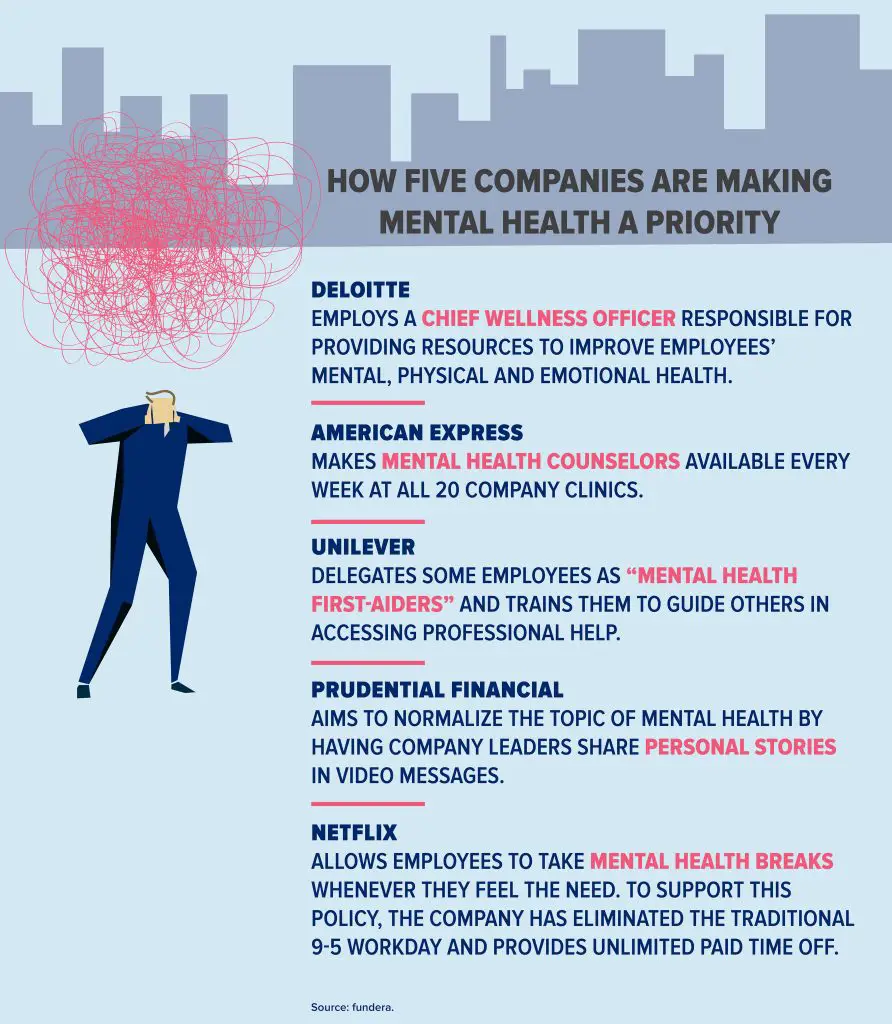
This image is property of shrm-res.cloudinary.com.
Incorporating Mental Health Programs in the Workplace
In order to effectively manage anxiety in the construction industry, it is vital to incorporate mental health programs into the workplace. These programs provide resources and support that can help construction workers cope with anxiety and promote overall well-being.
Importance of Mental Health Programs
Mental health programs are crucial in addressing and managing anxiety in the construction industry. By raising awareness, reducing stigma, and providing access to resources, these programs can empower workers to seek help and support. Mental health programs also contribute to creating a workplace culture that values and prioritizes mental well-being.
Suitable Mental Health Programs for Construction Workers
Different mental health programs can be implemented to cater to the specific needs of construction workers. These may include initiatives such as onsite counseling services, workshops on stress management and coping strategies, and employee assistance programs. It is important to tailor these programs to meet the unique challenges faced by construction workers.
Implementing and Evaluating Effective Mental Health Programs
To effectively manage anxiety, employers should implement and regularly assess the effectiveness of mental health programs. By monitoring outcomes, seeking feedback from workers, and adapting programs based on the evolving needs of the workforce, employers can continuously improve their efforts in addressing anxiety in the construction industry.
Professional Help and Resources for Anxiety
In addition to workplace initiatives, construction workers experiencing anxiety can seek professional help and utilize external resources to manage their symptoms effectively.
Psychological Counseling and Therapy
Psychological counseling and therapy are valuable resources for individuals experiencing anxiety. By working with trained professionals, construction workers can explore underlying issues, develop coping strategies, and receive support in managing their anxiety. Employers can support their employees by providing access to mental health professionals and educating them about available counseling services.
Support Groups and Peer Counseling
Joining support groups or engaging in peer counseling can provide individuals with a sense of community and understanding. Construction workers can share their experiences, learn from others facing similar challenges, and access valuable strategies for managing anxiety. Employers can facilitate the formation of support groups or provide information about existing resources to create a supportive network for workers.
Online Resources and Self-help Strategies
The internet offers a wealth of resources for managing anxiety. Construction workers can access online forums, websites, and apps that provide information on anxiety management techniques, meditation exercises, and self-help strategies. Employers can raise awareness about these resources and encourage workers to utilize them as part of their self-care routine.

This image is property of miro.medium.com.
Promoting Physical Health to Reduce Anxiety
In addition to addressing mental health concerns, promoting physical health is essential in reducing anxiety among construction workers. Employers can encourage behaviors that support overall well-being and contribute to anxiety management.
Encouraging Regular Exercise
Regular exercise has been widely recognized as an effective tool for managing anxiety. Employers can promote physical health by offering onsite or discounted gym memberships, organizing group workouts, or encouraging workers to incorporate physical activity into their daily routines. By supporting and incentivizing regular exercise, employers contribute to the overall well-being of their workers.
Healthy Dietary Habits to Cope with Anxiety
Dietary habits can significantly impact mental health. Employers can promote healthy eating by offering nutritious food options on-site, providing educational resources on balanced diets, and encouraging workers to prioritize healthy food choices. By fostering a culture of well-being through nutrition, employers support workers in effectively managing anxiety.
Importance of Adequate Rest and Recuperation in Anxiety Management
Adequate rest and recuperation are essential in managing anxiety. Employers should ensure that workers have access to sufficient rest breaks and promote the importance of taking time off to recharge. By valuing rest and promoting work-life balance, employers contribute to reducing anxiety levels and supporting the overall mental well-being of their workers.
Success Stories and Case Studies
Examining success stories and case studies can provide valuable insights into effective anxiety management strategies within the construction industry. By showcasing real-life examples, employers and workers can gain inspiration and learn from experiences that have led to positive outcomes.
Organizations that Successfully Managed Anxiety
Several organizations in the construction industry have implemented effective strategies to manage anxiety and promote mental well-being among their workforce. By highlighting these organizations and their approaches, other employers and workers can gain valuable insights and consider implementing similar initiatives in their own workplaces.
Personal Experiences and Success Stories in Handling Anxiety
Personal experiences and success stories from construction workers who have successfully managed their anxiety can be very inspiring. These stories provide a sense of hope and offer practical tips and strategies that others can implement. By sharing these experiences, individuals experiencing anxiety can feel encouraged and motivated to seek support and manage their symptoms effectively.
The Impact of Successful Anxiety Management in the Construction Industry
Successfully managing anxiety in the construction industry has a wide-reaching impact. Improved mental well-being among workers leads to healthier work environments, increased productivity, and higher job satisfaction. By prioritizing anxiety management, the overall climate within the construction industry can be positively transformed, benefitting both employers and employees.
In conclusion, understanding anxiety in the construction industry is crucial for both employers and workers. Identifying common triggers, recognizing physical symptoms, and addressing psychological and emotional impacts are essential steps in effectively managing anxiety. By implementing strategies such as promoting a positive work environment, incorporating mental health programs, and fostering effective communication, employers can mitigate anxiety and create a healthier, more supportive workplace culture. Providing access to professional help and resources, promoting physical health, and learning from success stories further contribute to effective anxiety management in the construction industry.
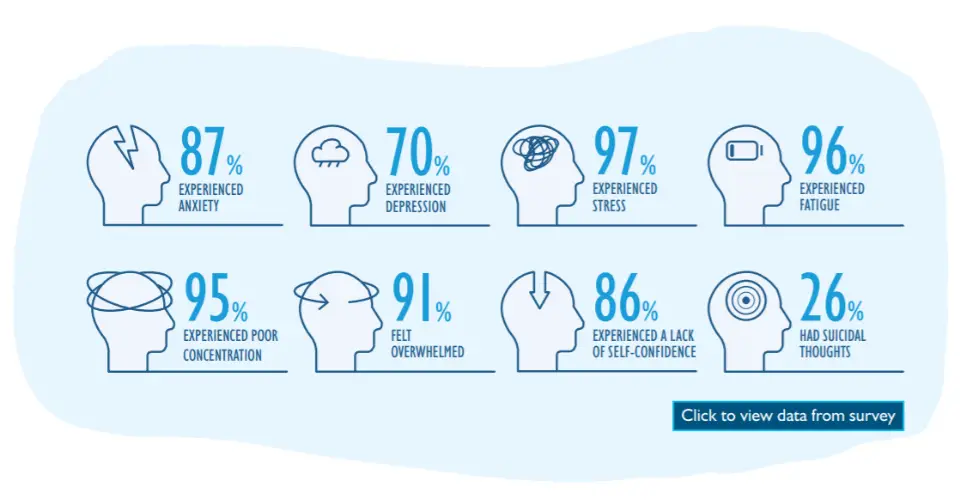
This image is property of d8.ciob.org.

